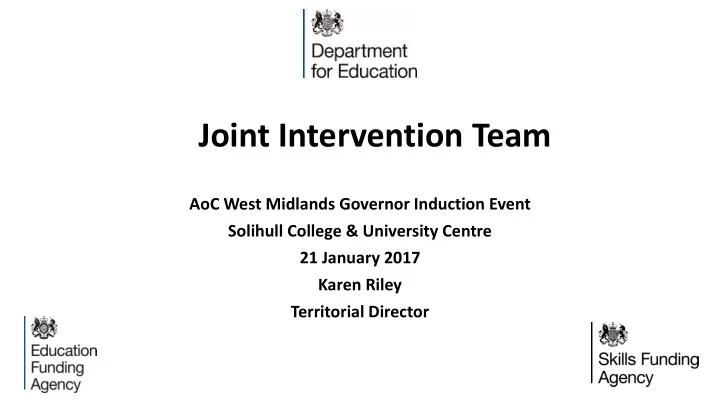

Joint Intervention Team AoC West Midlands Governor Induction Event Solihull College & University Centre 21 January 2017 Karen Riley Territorial Director
Content Update on the Joint Intervention Team in the West Midlands Risk based intervention – Formal & Prevention Area Reviews & Structural Change Reflections & Challenges 2
A changing landscape • New Government & Ministers • One Department • One Agency? 3
Role of the Intervention Team • Identify, manage and mitigate risk to provision and public funding; • Intervene early to prevent and address failure minimising the impact on students and • Support the Area Review process and oversee implementation 4
Joint Intervention Team in the WM Deputy Director Intervention Midlands & East Karen Riley East Midlands D2N2 & Greater Lincolnshire – Jane Peacock Greater Cambridgeshire, Peterborough, Norfolk & Suffolk – David Churchill Leicestershire, Stoke & Staffordshire – Lisa Hawes Birmingham & Solihull The Black Country Coventry & Warwickshire The Marches & Worcestershire South East Midlands Lorna Pursglove Michael Nicol Stuart Parkes
Risk based intervention - Formal • Lender of last resort where • Approach to Intervention set out November 2015 necessary through Funding • Quality – Ofsted Committee Inadequate & https://www.gov.uk/government/uploads/system/uploa • Support conditional on Minimum Standards strengthening Leadership & ds/attachment_data/file/475851/SFA- • Finance – Control & Governance and Health ApproachtoIntervention-Nov2015.pdf automatically triggers inadequate FH • Current position across the WM - 8 colleges in receipt of NOCs Exceptional Financial Triggers https://www.gov.uk/government/publications/sfa- Support current-notices-of-concern • No new Finance NOC’s expected in the WM based on initial assessment of 2016-2018 financial plans but Ofsted & MS subject to inspection results and year end FE success rates Notices of Commissioner Concern Stocktake • 5 cases escalated to the FE Commissioner with 6 colleges currently in receipt of EFS • Escalation to FEC led • JIT led intervention intervention following • Work underway to align NOC’S & NTIs • Oversight of college CRG consideration recovery plan through • Recommendations regular case revisited every 6 conferences months through stocktakes
Risk based intervention - Prevention • NAO recommended a more proactive approach resulting in the risk based policy published in November 2015 https://www.gov.uk/government/uploads/system/uploads /attachment_data/file/475853/SFA_Early_Intervention_Str ategy_Nov_2015.pdf • A series of trend indicators (financial health, forecasting Triggers/ & quality) are used as triggers alongside institutionally Mitigation generated intelligence/feedback to flag potential risks Intelligence • Dialogue with colleges to assess understanding of the risks and the action being taken/planned to remedy • Where assurance secured light touch oversight maintained. Where assurance not secured, the policy sets out steps to escalate concerns Dialogue • A relatively small number of colleges have been identified as low risk in the WM. Dialogue is either planned or suggests mitigation is in place to address risks
Area Reviews JIT & Combined FE/SFC JARDU Transaction /Local Advisers Unit Authority College Progress Next Phase • Waves 1-3 completed, all WM reviews in first 3 Transition Grant waves - Birmingham & Solihull, Marches & Worcestershire, Coventry & Warwickshire, Black Restructuring Facility Country, and Stoke & Staffordshire. • All WM reviews now in implementation phase. Guidance for LEPs and local Key outcomes: authorities - Structural changes - 11 Implementation Guidance & Due - Academy conversions - 7 Diligence Framework - Apprenticeship Organisations – up to 3 - Institute of Technology – 1 Academisation guidance (inc. TU - ATA – 1 assessment) - One extension to secure sustainable solution
Implementation Guidance Developed with wide range of stakeholders – currently consulting widely and aim to publish shortly Takes account of lessons from previous changes and from other parts of UK; builds in views of Turnaround experts; The essential building blocks: Having the right “change” expertise Have a shared vision for the institution Good planning and project management Strong governance and leadership, including clear accountability Excellent communications and stakeholder engagement – with learners; employers; staff; LEPs/local authorities; lenders etc Phase 1 Phase 4 Phase 2 Phase 3 The right Legal Approvals people with Planning transition & the right skills delivery 9
Reflections & Challenges Restructuring Facility Devolution Pensions Capital & VAT Learning Apprenticeship Insolvency Reforms Lessons Regime Capacity & Capability Banks Professional Alternative Advisers Structures 10
Any Comments or Questions? 11
Recommend
More recommend